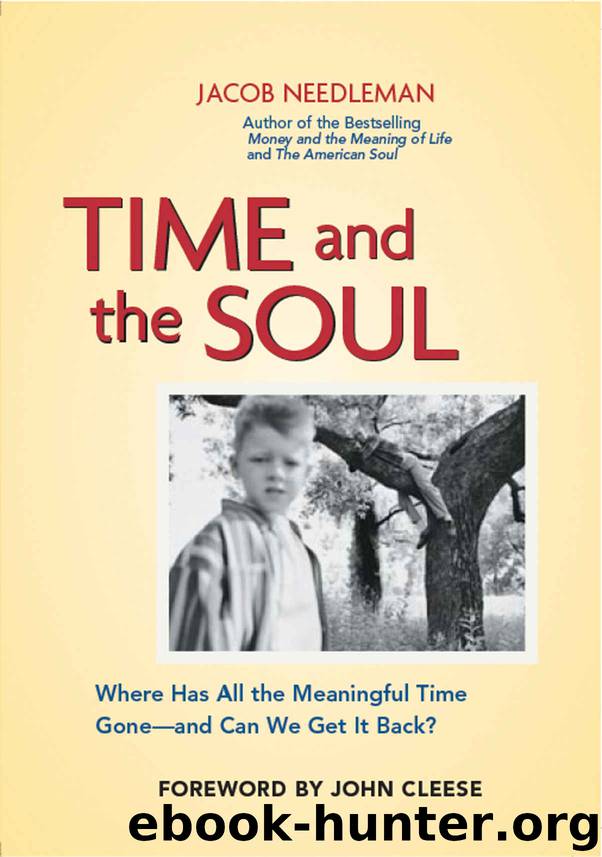Time and the Soul by Jacob Needleman

Author:Jacob Needleman [Needleman, Jacob]
Language: eng
Format: azw3
Publisher: Berrett-Koehler Publishers
Published: 2003-05-02T16:00:00+00:00
CHAPTER 6
WHAT TO DO?
What to do? It is that question that sends Eliot back in time to accompany himself as an adolescent at the threshold of manhood. In no way can he understand what Max means by remembering. Like the ancient pupil Tat standing before his teacher Hermes, Eliot finally bows his head in sorrow. “Max,” he says softly, “I can’t understand. What you’re asking is completely beyond my power.” And just as Hermes replies to Tat, Max answers, in his own idiom: “Cut it out, Appleman! Try …try.…”Wasn’t it Krishna himself, lord of the universe, who rebuked the warrior Arjuna for his sadness and his unwillingness to engage in a struggle he does not yet understand: “Why this lifeless dejection, Arjuna? … Fall not into this degrading weakness. … Fight, Arjuna!”
The emotional reactions that devour our time are only the most obvious evidence that our relationship to time depends primarily on our inner state and not on any objective characteristics of time itself. We are called to a struggle we do not yet understand; and therefore our first task is to try to see why, in spite of this, we must begin this incomprehensible work, this effort to remember the Self. When man is closer to the Self, time is no longer the enemy, so we are told by the ancient wisdom. It is the man who is less than Man whom time mercilessly destroys. It is the self that is less than the Self that is devoured by time.
But it is clear that the effort we need to make cannot be explained in words; otherwise the pupil would not be bowing his head before the teacher or the god. The understanding that we need cannot come through ideas or doctrines alone. We must try something. But what?
Nor, as has already been said, can techniques or methods by themselves be of help. Not even methods borrowed from sacred sources and applied as a form of psychological technology. We can recite mantras and meditate and “be here now.” But who is meditating? Who is reciting the mantra? What does he or she want? To “save time” or to understand? Time cannot be “saved.” It can only be given—and given, so we are told, as a result of the mysterious effort to understand the truth and serve the good within ourselves and within the universal world. To try to save time, to try to get time, is as futile as trying to get happiness, that happiness which is not pleasure but an abiding sense of meaning and well-being. Such things are given, not taken. But in order to receive, the hand needs to be open. What we are speaking of here are efforts that can open a man or woman to the great winds of conscious, enduring selfhood.
We need a new way to approach the aspects of our inner lives that destroy or degrade time. What does wisdom tell us about worry and anxiety, for example, or busyness or daydreaming or
Download
This site does not store any files on its server. We only index and link to content provided by other sites. Please contact the content providers to delete copyright contents if any and email us, we'll remove relevant links or contents immediately.
The Motivation Myth by Jeff Haden(5212)
Audition by Ryu Murakami(4930)
Adulting by Kelly Williams Brown(4574)
The Confidence Code by Katty Kay(4260)
A Mind For Numbers: How to Excel at Math and Science (Even If You Flunked Algebra) by Barbara Oakley(3306)
Waiting in the Wings by Melissa Brayden(3218)
Self-Esteem by Matthew McKay & Patrick Fanning(3144)
Fooled by Randomness: The Hidden Role of Chance in Life and in the Markets by Nassim Nicholas Taleb(3123)
The ONE Thing by Gary Keller(3071)
Nice Girls Don't Get the Corner Office by Lois P. Frankel(3044)
The Dictionary of Body Language by Joe Navarro(2996)
How to be More Interesting by Edward De Bono(2791)
Designing Your Life by Bill Burnett(2745)
Getting Things Done by David Allen(2699)
The Plant Paradox by Dr. Steven R. Gundry M.D(2620)
Police Exams Prep 2018-2019 by Kaplan Test Prep(2546)
What Color Is Your Parachute? 2015 by Richard N. Bolles(2311)
Dangerous Personalities by Joe Navarro(2289)
When to Jump by Mike Lewis(2241)
